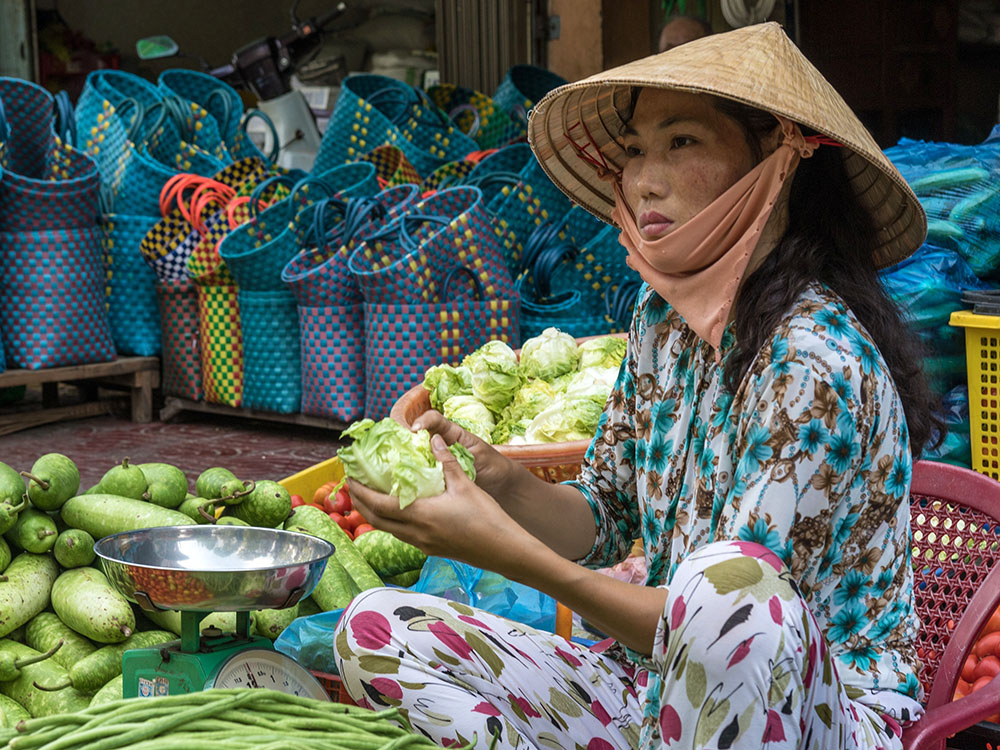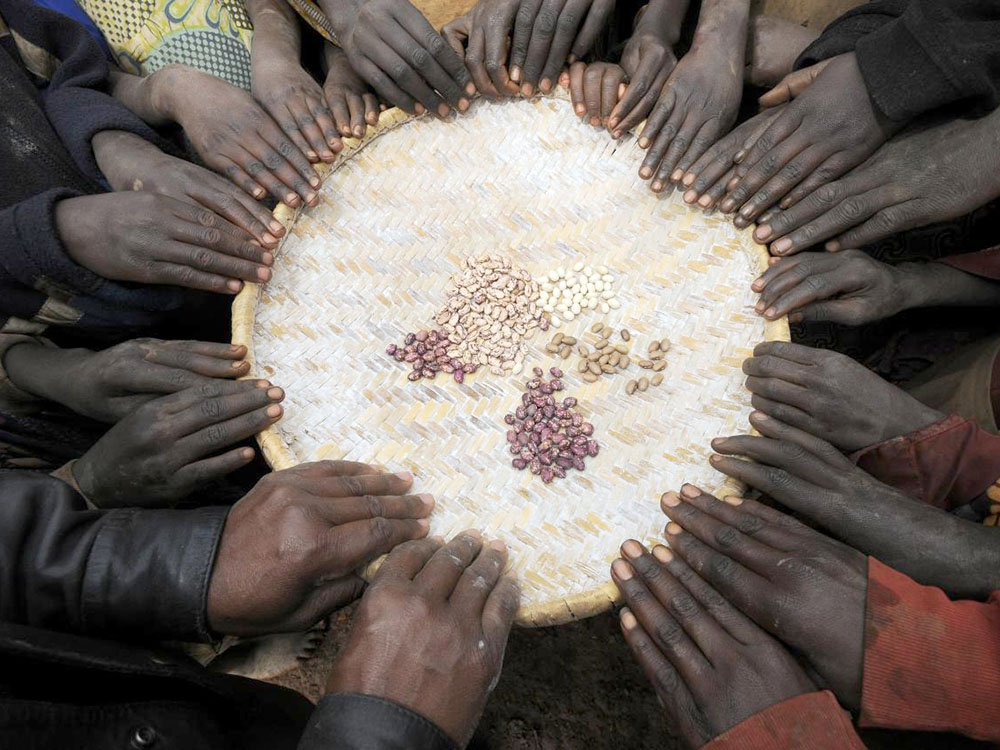We make the results of our research and advisory work on climate change available through our own Working Paper Series, through reports published by our projects, collaborators and clients, and through academic publications (journal papers and book chapters).
NRI's Working Paper Series on Climate Change, Agriculture and Natural Resources
- Working Paper No.1 (2010) Climate Change, Agricultural Adaptation and Fairtrade: Identifying the Challenges and Opportunities, by Valerie Nelson, John Morton, Tim Chancellor, Peter Burt and Barry Pound
- Working Paper No.2 (2011) Gender and 'Modern' Biofuels: A Guidance Paper for Policy-Makers, by Valerie Nelson and Yianna Lambrou
- Working Paper No. 3 (2011) Scoping the Gender Issues in Liquid Biofuel Value Chains, by Valerie Nelson and Yianna Lambrou
- Working Paper No. 4 (2012) Coffee and Climate Change: Impacts and options for adaption in Brazil, Guatemala, Tanzania and Vietnam, by Jeremy Haggar and Kathleen Schepp
- Working Paper No. 5 (2013) Supporting Ecosystem Services in Fairtrade Value Chains
We also have limited numbers of hard copies available: please request copies from Caroline Troy c.troy@gre.ac.uk
Other Major Reports
- Nelson, V., R. Lamboll, and M. Joshua (2020) Farmer Field Schools to Strengthen Community Resilience to Climate Change: Learning Brief. NRI, University of Greenwich and University of Malawi report commissioned by the EC Global Climate Change Programme.
- Nelson, V., R. Lamboll, and M. Joshua (2019) Annual Review of Global Climate Change Alliance (GCCA) – Malawi activities: ‘Strengthening Community Resilience to Climate Change in Blantyre, Zomba, Neno and Phalombe Districts', DCI-ENV/2014/354-363. Main Evaluative Learning Report, NRI, University of Greenwich and Chancellor College. Chatham; UK.
- Organisational Strategies and Structures for Climate Change Research in sub-Saharan Africa
- Gender and Drylands Development: Empowering Women for Change
Reports from the project Climate Learning for African Agriculture led by NRI, FARA and AFAAS.
- Final Report: Climate Agriculture and Knowledge in Africa: Agricultural Research and Advisory Services in the Face of Climate Change
- Working Paper No.1 - Exploring the links between Climate Change, Agriculture & Development: A Briefing Paper
- Working Paper No.2 - Exploring the linkages and guiding concepts relevant to Climate Change, Agriculture and Development: A Detailed Resource Document
- Working Paper No.3 - Innovation Systems for Agriculture and Climate in Benin: an Inventory
- Working Paper No.4 - African Agricultural Research and Advisory Services under Climate Change: Perspectives from an E-Discussion
- Working Paper No.5 - Innovation Systems for Agriculture and Climate: Analysis of Three Case-Studies from Benin
- Working Paper No.6 - Climate Learning for African Agriculture: The Case of Mozambique
- Working Paper No.7 - Climate Learning and Knowledge Management within Uganda’s Agricultural Research and Advisory Services
NRI staff have also written, or collaborated on, a number of important reports and papers published by outside organisations. We highlight a number of these, all of which are freely available for download:
- Exploring Urban Rural Interdependence and the Impact of Climate Change in Tanzania and Malawi by E. Liwenga, E. Swai, L. Nsemwa, A. Katunzi, B. Gwambene, M. Joshua, F. Chipungu, T. Stathers and R. Lamboll for IRDC
- Emerging Approaches for Responding to Climate Change in African Agricultural Advisory Services: Challenges, Opportunities and Recommendations for an AFAAS Climate Change Response Strategy by Richard Lamboll, Valerie Nelson and Nick Nathaniels, for the African Forum for Agricultural Advisory Services (2011)
- Technologies for Climate Change Adaptation – Agriculture Sector by R. Clements, J. Haggar, A. Quezada and J. Torres, ed. X. Zhu, for the UNEP Risø Centre (2011)
- Climate Change, Gender and Smallholder Agriculture by Valerie Nelson. Report commissioned by CIAT-Africa and the Pan African Bean Research Networks. CIAT Working Paper (2011)
- Gender, Generations, Climate Change and Social Protection: Thematic Review and Annotated Bibliography by Valerie Nelson, ODI Working Paper(2011)
- Responding to Climate Change in Viet Nam: Opportunities for Improving Gender Equality: A Policy Discussion Paper by Koos Neefjes, Valerie Nelson and others, Oxfam/UNDP-Viet Nam Report (2009) - Migration, Resettlement and Climate Change in Viet Nam
- Climate Change and Land Tenure: The Implications of Climate Change for Land Tenure and Land Policy by Julian Quan with Nat Dyer, FAO Land Tenure Working Paper (2008)
Journal Papers and Book Chapters
2018
- Ayanlade, A., Radeny, M., Morton, J. F., & Muchaba, T. (2018). Rainfall variability and drought characteristics in two agro-climatic zones: An assessment of climate change challenges in Africa. Science of the Total Environment 630, 728-737.
- Derkyi, M., Adiku, S. G., Nelson, V., Dovie, B. D., Codjoe, S., & Awuah, E. (2018). Smallholder farmers’ perception of climatic and socio-economic factors influencing livelihoods in the transition zone of Ghana. AAS Open Research, 1.
- Opare, P., Akintonde, J. O., Obeng-Ofori, D., & Nelson, V. (2018). Using climate analogue tools to explore and build smallholder farmer capacity for climate smart agriculture. AAS Open Research, 1.
2017
- Ademola A., Ford, J., Morton, J. et al. (2017) Managing Climate Change Risks in Africa - A Global Perspective. Ecological Economics Vol. 141 pp. 190-201.
- Antwi-Agyei, P., Quinn, C., Adiku, S., Codjoe, S., Dougill, A., Lamboll, R. and Dovie, D. (2017) Perceived stressors of climate vulnerability across scales in the Savannah zone of Ghana: A participatory approach. Regional Environmental Change 17(1), 213-227.
- Ayanlade, A., Radeny, M. and Morton, J. (2017) Comparing smallholder farmers’ perception of climate change with meteorological data; a case study from Southwestern Nigeria. Weather and Climate Extremes 15: 24-33.
- Belay, A., Recha, J., Woldeamanuel, T. and Morton, J. (2017) Smallholder farmers' adaptation to climate change and determinants of their adaptation decisions in the Central Rift Valley of Ethiopia. Agriculture & Food Security 6 (24)
- Mungai, C., Opondo, M., Outa, G., Nelson, V., Nyasimi, M., & Kimeli, P. (2017). Uptake of climate-smart agriculture through a gendered intersectionality lens: experiences from Western Kenya. In W. Leal Filho et al. (eds.) Climate Change Adaptation in Africa, Springer International Publishing, pp.587-601.
- Ifeanyi-Obi, C. C., Togun, A. O., Lamboll, R., Adesope, O. M., & Arokoyu, S. B. (2017). Challenges faced by cocoyam farmers in adapting to climate change in Southeast Nigeria. Climate Risk Management 17, 155-164.
- Ifeanyi-Obi, C. C., Togun, A. O., Lamboll, R., & Arokoyu, S. (2017). Socio-Economic Determinants of Cocoyam Farmer’s Strategies for Climate Change Adaptation in Southeast Nigeria. Journal of Agricultural Extension 21(2), 91-104.
- Kassian, L., Tenywa, M., Liwenga, E., Wellard-Dyer, K., and Bamutaze, Y. (2016) Implication of climate change and variability on stream flow in Iringa region, Tanzania. Journal of Water and Climate Change 8(2): 336-347.
- Lamboll, R., Stathers, T., & Morton, J. (2017). Climate change and agricultural systems. In S. Snapp and B. Pound (eds.) Agricultural Systems (Second Edition), Academic Press, pp.441-490.
- Morton, J. (2017). Climate change and African agriculture: unlocking the potential of research and advisory services. In F. Nunan (ed.) Making Climate Compatible Development Happen, Routledge, pp.109-135.
- Quan, J., Naess, L.O., Newsham, A., Sitoe, A. and Fernandez, M.C. (2017) The political economy of REDD+ in Mozambique: implications for climate compatible development. In F. Nunan (ed.) Making Climate-Compatible Development Happen. Routledge, pp.151-181.
2016
- Elum, Z.A., Modise, D.M. & Marr, A. (2016). Farmer’s perception of climate change and responsive strategies in three selected provinces of South Africa. Climate Risk Management 16: 246-257.
- Ifeanyi-Obi, C. C., Togun, A. O., and Lamboll, R. (2016). Influence of Climate Change on Cocoyam Production in Aba Agricultural Zone of Abia State, Nigeria. In W. Leal Filho et al. (eds). Innovation in Climate Change Adaptation, Springer International Publishing, pp. 261-273.
- Joshua, M.K., Ngongondo, C., Chipungu, F., Monjerezi, M., Liwenga, E., Majule, A., Stathers, T. and Lamboll, R. (2016) Climate change in semi-arid Malawi: Perceptions, adaptation strategies and water governance. Jàmbá: Journal of Disaster Risk Studies 8(3).
- López-i-Gelats, F., Fraser, E., Morton, J. and Rivera-Ferre, M. (2016) What drives pastoralists' vulnerability to global environmental change? Pathways of vulnerability. Global Environmental Change 39: 258-274.
- Rivera-Ferre, M., López-i-Gelats, F., Howden, M., Smith, P., Morton, J., Herrero, M. (2016) Re-framing the climate change debate in the livestock sector: mitigation and adaptation options. WIRes Climate Change 7(6), 869-892.
2014-15
- Joshua, M., Ngongondo, C., Mwathunga, E., Liwenga, E., Stathers, T., Chipungu, F., Lamboll, R., Majule, A. and Ndau, S. (2015) Implications of climate change risks on rural-urban agricultural and food flows in Blantyre City, Malawi. Journal of Public Administration 50(1):125-142.
- Morton, J. (2015) Agricultural adaptations: social context and complexity. In J. Palutikof, S. Boulter, J. Barnett, J. and D. Rissik, (eds.) Applied Studies in Climate Adaptation: Australian Experiences. Wiley, Oxford.
- Dasgupta, P., Morton, J., Dodman, D., Karapinar, B., Meza, F., Rivera-Ferre, M., Toure Sarr, A. and Vincent, K. (2014) Rural Areas. In C. Field, V. Barros et al. (eds.) Climate Change 2014: Impacts, Adaptation, and Vulnerability. Part A: Global and Sectoral Aspects. Contribution of Working Group II to the Fifth Assessment Report of the Intergovernmental Panel on Climate Change. CUP, Cambridge and New York.
- Baca, M., Läderach, P., Haggar, J., Schroth, G., & Ovalle, O. (2014). An integrated framework for assessing vulnerability to climate change and developing adaptation strategies for coffee growing families in Mesoamerica. PLoS One, 9(2), e88463.
- Morton, J., Solecki, W., Dasgupta, P., Dodman, D., Rivera-Ferre, M (2014) Urban-Rural Interactions – Context for Climate Change Vulnerability, Impacts, and Adaptation. Cross-Chapter Box in C. Field, V. Barros et al. (eds.) Climate Change 2014: Impacts, Adaptation, and Vulnerability. Part A: Global and Sectoral Aspects. Contribution of Working Group II to the Fifth Assessment Report of the Intergovernmental Panel on Climate Change. CUP, Cambridge and New York.
- CGIAR Research Program on Climate Change, Agriculture and Food Security (CCAFS) http://ccafs.cgiar.org/
- Intergovernmental Panel on Climate Change, Working Group II on Impacts, Adaptation and Vulnerability
http://www.ipcc-wg2.gov/index.html
- Professor John Morton – Programme leader
- Dr Louise Abayomi
- Professor Chris Atkinson
- Dr Peter Burt
- Dr Tim Chancellor
- Professor Bob Cheke
- Professor Maruthi Gowda
- Professor Jeremy Haggar
- Richard Lamboll
- Dr Diego Naziri
- Professor Valerie Nelson
- Professor John Porter
- Dr Helena Posthumus
- Professor Julian Quan
- Dr Apurba Shee
- Dr Tanya Stathers
- Dr Conor Walsh
- Dr Kate Wellard
Climate Impacts Research Capacity and Leadership Enhancement Programme (CIRCLE) (2015-19)
NRI leads the Quality Support Component of this FCDO-funded programme which has supported 100 African early-career researchers in climate-related fields to spend a year in another African institution. NRI leads the Quality Support Component, identifying and contracting international specialist advisers to work with the Fellows, as well as facilitating workshops for Fellows, their supervisors and senior management of the participating African universities. NRI staff have themselves served as specialist advisers to around 50 CIRCLE Fellows, working with Fellows from both agricultural science and social science backgrounds.
Monitoring and Evaluation of the Global Climate Change Alliance in Malawi
The Global Climate Change Alliance aims to 'contribute to the alleviation of poverty through enhancing the resilience of Malawian institutions and communities at national and local levels to climate change risks and impacts'. The GCCA in Malawi is being funded by the European Commission. The GCCA comprises two key components with respect to implementation:
- Mainstreaming climate change adaptation and mitigation in the irrigation sector through the Planning for Climate Change project.
- Increase in resilience of vulnerable communities in four southern districts through the Community Resilience to Climate Change project.
A third key component is the M&E which aims to generate and share evidence and learning in support of the GCCA programme objective. The Natural Resources Institute (NRI), University of Greenwich, in partnership with a team from Chancellor College, Malawi, is conducting the Monitoring and Evaluation at the programme level for the Global Climate Change Alliance (GCCA) in Malawi. This work officially started on the 1st of October, 2015 and runs until 2019.
Climate Learning for African Agriculture
This two-year research project is studying the extent to which principles of climate-compatible development have been incorporated into the strategies and practices of African agricultural research and extension services. NRI is collaborating with the Forum for Agricultural Research in Africa, and the African Forum for Agricultural Advisory Services, to lead a continent-wide survey, in-depth learning exercises in four countries (Benin, Sierra Leone, Mozambique and Uganda), and action-oriented dissemination of results to stakeholders.
Assessing the potential of farmer exchanges based on climate analogue analysis
NRI is working with the CGIAR Research Programme on Climate Change, Agriculture and Food Security (CCAFS) to pilot methods for farmer–to-farmer exchanges using participatory learning approaches and the CCAFS spatial climate analogue tool. The aim is to assess how adaptive capacity may be strengthened through visits by farmers to areas which are thought likely to represent their future climate and farming systems. The project has facilitated exchanges between different zones of Tanzania, and between Ghana and Burkina Faso, in 2012.
Coffee and climate change: impacts of climate change on four countries
NRI led the development of a report for the GIZ Coffee and Climate Change programme, a public-private partnership with various European coffee roasters and traders. The project highlighted the substantial impacts on coffee production and supply of current climate variability and projected climate change in Guatemala, Brazil, Tanzania and Vietnam.
Technologies for Climate Change Adaptation in the Agriculture Sector
An NRI staff member acted as co-author and reviewer for this important handbook published by the UNEP Risø Centre on Energy, Climate and Sustainable Development.
Agricultural adaptation in Tanzania and Malawi
Action research and shared learning among different stakeholder groups is strengthening local agricultural innovation systems to respond to climate change. NRI has worked in partnership with the University of Dar es Salaam and the University of Malawi to establish farmer learning groups covering soil, water, seed and agrobiodiversity management and weather information. The partnership also brought together researchers, local governments, extension services, media and NGOs in regional and national learning platforms. This project was funded by the Foreign, Commonwealth and Development Office (FCDO) through the International Development Research Centre (IDRC).
Study on climate change, agriculture and Fairtrade
This desk study for the Fairtrade Foundation on the implications of climate change for smallholder producers and Fairtrade reviewed the risks to some major Fairtrade commodities and trade flows, and highlighted the possibilities for adaptation associated with Fairtrade.
Urban-rural interdependence and the impact of climate change
This three-year IDRC and FCDO-funded action research project managed by the University of Dar es Salaam with NRI and the University of Malawi, explores the complex and interdependent rural-urban food and agricultural systems in Malawi and Tanzania. NRI is working with key stakeholders in order to strengthen their understanding of these interactions and dynamics and collectively to develop ways of improving the climate resilience of these systems.
Fifth Assessment Report of the IPCC
NRI staff members are serving as Co-ordinating Lead Authors for the chapter on Food Systems and Food Security, and the chapter on Rural Areas within the second volume, Impacts, Adaptation and Vulnerability, of the Fifth Assessment Report of the Intergovernmental Panel on Climate Change (IPCC), to be published in 2014.
The NRI Programme on Climate Change, Agriculture, and Natural Resources brings to bear our expertise in smallholder agriculture, natural resources management, economic development and rural livelihoods on the challenges posed by climate variability and change. Together with our partners, we will contribute to the search for effective mitigation and adaptation strategies.
Our key areas of intervention in climate change are:
- Identifying and assessing potential climate change impacts, especially the consequences for poor people's livelihoods
- Developing and implementing appropriate technical, institutional and policy-based strategies for adaptation in collaboration with partners
- Examining and enhancing the interconnections between climate change adaptation and processes of agricultural innovation, at national and local level
- Analysing existing mitigation strategies and assisting in the development of equitable and sustainable future mitigation pathways
- Supporting southern voices in responses to climate change, particularly at the grass-roots level.
Responding to climate change is one of the most urgent challenges facing humankind. The most severe impacts are likely to be suffered by the poorest and most vulnerable in society who live in more fragile environments and have the least resources to adapt and recover. The majority of the world’s poor continue to live in rural areas and their livelihoods are heavily dependent upon agriculture and natural resources, which will be severely affected by climate change. Therefore, there are serious implications for their food security, health and well-being.
Over the next decades, changes in the averages and variation of rainfall and temperature will have a profound effect on agriculture. Even in the shorter term, climate change is affecting agriculture through increased frequency and severity of extreme events, such as droughts, floods and heatwaves.
There is great potential for smallholders in developing countries to adapt to climate change. Much of this will comprise an intensification of their current adaptations to climate variability through activities such as selection of appropriate crops and varieties, manipulation of planting times, micromanagement of soil and water, and livelihood diversification. However, adaptation will crucially depend on the availability of appropriate technologies, knowledge and institutions, and having the right supporting policies and advice in place.
The scale of projected climate changes and the challenges posed by existing climate variability to disadvantaged smallholders in low-income countries are immense. Therefore, there is an urgent need to understand these challenges better, to build adaptive capacities for households, communities, local agencies, companies, sustainability standard bodies and governments, to develop appropriate strategies for sustainable and equitable rural adaptation.





